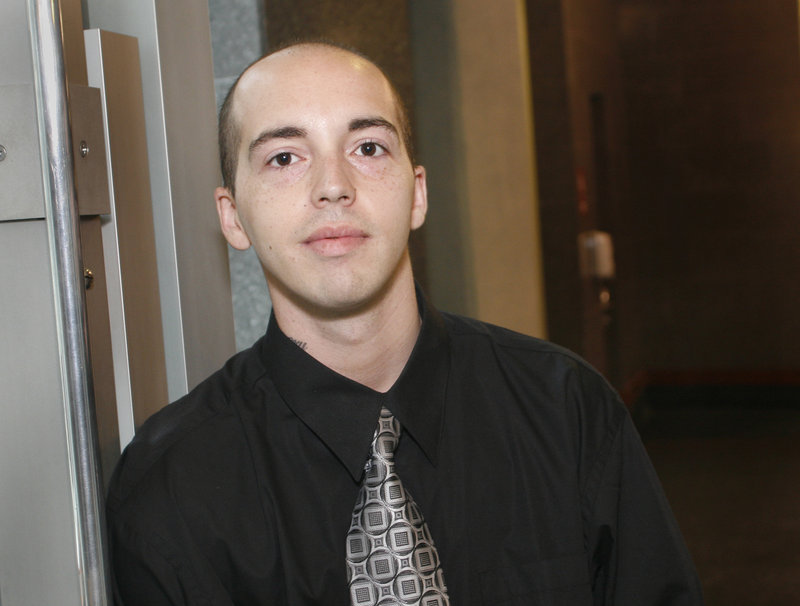PORTLAND – It took Chris Miller 550 days to get through drug court.
The road to his graduation Friday from the Cumberland County Adult Drug Treatment Court was a hard one. For a while, he was still hanging out with the wrong people, and in the wrong places. He went to jail and rehabilitation when he failed to meet the program’s strict guidelines.
There were times when he wanted to drop out.
The Portland resident reached a turning point after four months at the St. Francis Recovery Center in Auburn. It was the best experience of his life, he said, one that changed his outlook.
“I wanted to make it more than I wanted to get high or use drugs or alcohol,” Miller said. “I wanted my freedom back.”
At Friday’s graduation, Judge Jeffrey Moskowitz invited Miller to the podium, told him he looked like “a zillion dollars” and congratulated him. The judge came down from the bench to present Miller with a diploma and a Maine Drug Court Graduate coin.
“That’s a lot of hard work,” Moskowitz said. “It’s paid off.”
The 550 days Miller spent in the program was actually a small period in his long struggle with drugs. Miller, who’s 28, said he started using drugs when he was about 13 years old.
He said the nine months since St. Francis is the longest period he has gone without using.
“Finally, he made it, and he’s wonderful when he’s sober,” said his mother, Vicki Miller of Portland.
Originally, Miller said, his main motivation for joining drug court was to avoid jail. He had violated probation after being convicted of a robbery in which he tried to steal alcohol.
Drug courts in Maine require participants to plead guilty to the charges against them. The best-case scenario for those who successfully complete the program is that they won’t serve any more jail time, said Hartwell Dowling, who oversees the state’s six drug courts for adults. Graduates typically are on probation, he said.
The program’s requirements include curfews, attendance at 12-step meetings, community service and random drug testing. Drug court teams include caseworkers, probation officers, judges, prosecutors and defense lawyers.
The graduation rate in Maine is about 61 percent, compared with the national rate of 48 percent, Dowling said. He said he believes that the smaller scale of Maine’s drug court gives participants much more attention than they get in larger programs.
About 16 percent of Maine’s drug court graduates are arrested within the next year, versus about 33 percent for those who go through the regular court system, Dowling said.
Miller was one of two participants who graduated after Friday’s regular drug court session in Cumberland County Superior Court. The other declined to be interviewed.
During the session, Moskowitz spoke briefly with each of the two dozen participants, offering encouragement and, at times, pointing out areas for improvement.
Moskowitz asked each about the past week, showing how closely the drug court team follows the details of participants’ lives.
He inquired about the health of one participant’s relative, and asked another how he was progressing on the paint job on his mother-in-law’s house.
The judge asked one participant to write a description of how he spends the day when he’s with his children, and encouraged another to think about returning to school.
For a man who tried to fake a urinalysis, Moskowitz denied a request for early release from jail, even though it meant he would miss more classes.
The program is operating in a time of financial uncertainty. Gov. Paul LePage’s proposed budget would cut Dowling’s position, which is funded with tobacco settlement money through the Fund for a Healthy Maine. The judiciary will be able to absorb the position if its budget, as proposed by the governor, is approved, said Mary Ann Lynch, spokeswoman for the court system.
The coordinator position is part of what makes the drug court program run smoothly, said Sarah Churchill, a defense lawyer who serves on the drug court team.
“Drug court is one of the ways the state of Maine gets a good bang for its buck,” she said.
For Miller, drug court graduation means it’s time to start studying for his general equivalency diploma, said his mother. He hopes to attend college to study behavioral health and human services. He plans to go into social work and work in substance abuse rehabilitation.
Staff Writer Ann S. Kim can be contacted at 791-6383 or at:
akim@pressherald.com
Send questions/comments to the editors.



Success. Please wait for the page to reload. If the page does not reload within 5 seconds, please refresh the page.
Enter your email and password to access comments.
Hi, to comment on stories you must . This profile is in addition to your subscription and website login.
Already have a commenting profile? .
Invalid username/password.
Please check your email to confirm and complete your registration.
Only subscribers are eligible to post comments. Please subscribe or login first for digital access. Here’s why.
Use the form below to reset your password. When you've submitted your account email, we will send an email with a reset code.